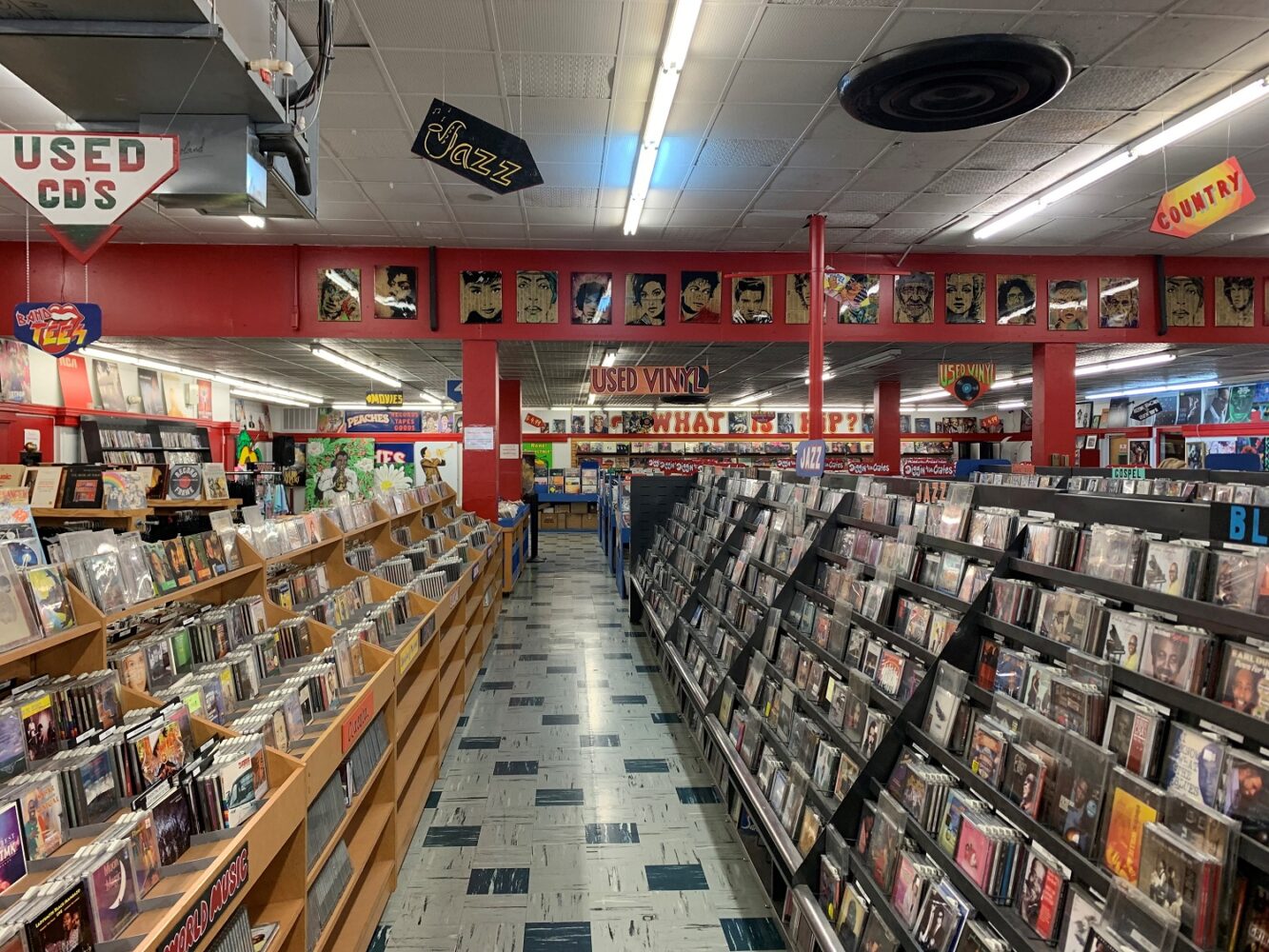Peaches Records
A record store acts as a musical and social nexus
Published: May 31, 2022
Last Updated: June 1, 2023

Photo by Chris Turner-Neal
Peaches Records.
When you enter the doors of 4318 Magazine Street, you’ll be greeted by Shirani Rea, the owner and founder, who has spent nearly every day in the record store for the past half a century. Peaches is the embodiment of Rea’s philosophy that we are all connected, all in this together, and that it’s essential to strengthen your community by taking care of everyone, listening to their ideas and encouraging their talents.
Rea’s children, Lillie and Lee, also man the front of the shop. Over the years, Gentilly neighborhood kids and aspiring musicians have helped out in the aisles, most notably Mia Young, aka Mia X, aka Mama Mia, aka The Mother of Southern Rap, who affectionately claims that she worked there until the day she was certified gold.
Established in 1975, Peaches has occupied many spaces throughout New Orleans: a corner of the Riverbend, adjacent to Cooter Brown’s; 3129 Gentilly Boulevard, which remained its home for nearly thirty years and became a meaningful space for the community; a spot along North Peters Street in the French Quarter, when it reopened after Hurricane Katrina; and its current and largest location, uptown on Magazine Street.
Throughout the ’80s and ’90s, the beloved Gentilly location seemed to defy the parameters of its walls. Somehow the minimal square footage made space for records, cassettes, performances, parties, and coin-operated games that kids could play after school.
Hip hop fans know the Peaches of that era as an early home for many of the producers and rappers from Cash Money and No Limit Records. Rea had hand-painted billboards outside promoting their new releases, in-store performances, and a fortuitous connection that became a part of the city’s oral history.
As the story goes, in the mid ’90s, an executive at Universal asked Rea if she had any strong southern music recommendations. She replied with a copy of young B. G.’s mixtape, Chopper City, which eventually led to a multi-million dollar contract and a partnership between Universal Records and Cash Money that holds to this day.
Over the years, Gentilly neighborhood kids and aspiring musicians have helped out in the aisles, most notably Mia Young, aka Mia X, aka Mama Mia, aka The Mother of Southern Rap, who affectionately claims that she worked there until the day she was certified gold.
There are photos, littered across the archives of the internet, of Shirani Rea hugging everybody in the business. She raised her children in the shop and if you ask her who she considers her children to be, she’ll include everyone in the neighborhood, everyone in the industry who she met and encouraged when they were just starting out, everyone who needed her, as well as her biological kids. The Hot Boys spent many of their teen years there. Some surprising names written on the Shirani Rea symbolic family tree are Big Freedia, KLC, Mystikal, Curren$y, Robin Barnes, Dee-1, Lil Wayne, and Mannie Fresh.
Even non-musicians come into Peaches asking for Rea’s life and musical advice, support, connections, stories, and sometimes to see if she will pray with them. The extended community remembers and appreciates that she was willing to take a shot on local rap music and other underground genres. So, when Master P is in town, he still stops by.
In addition to the comprehensive inventory of records, CDs, cassettes, turntables, audio equipment, paintings, stickers, keychains, books, T-shirts, record crates, greeting cards, posters, listening stations, and a pinball machine, the store has some truly unusual items.
Above the register is an original cross from St. Jude’s Church, a congregation which once existed nearby, where Rea regularly donated food, clothing, and a percentage of sales. In the front window, surrounded by colorful pop art, albums, and orchids, are cremation urns filled with ashes of loved ones who have passed. There have been celebration-of-life processions up and down the aisles of the Uptown shop, birthday parties for children and adults, a record-themed wedding, and Thanksgiving potlucks hosted at the old Woolworth’s counter. Civil rights activists have come into the shop to speak about that counter and its history as a seat of segregation protests; people who were at those protests have come into the store to share their stories about being arrested and taken to the now-defunct police station across the street.
If you’re planning on swinging by Peaches to grab a specific record, purchase it, and leave, you’re welcome to; it is a shop, after all. Maybe pause though. Take a moment to remember the futures dreamt up, the careers launched, the births celebrated, the hugs given, and the favorite albums discovered, and send a smile of thanks over to Shirani Rea and her enormous, eccentric, immensely talented chosen family.
Sabrina Stone is a NYC-born, New Orleans–based musician and writer. Her work is featured in OffBeat, I’m Music, Very Local, Where Y’At, ANTIGRAVITY, Hello Giggles, Quarterlette, Femsplain, and the Huffington Post. She has released four albums and headlined shows in New York, New Orleans, and Melbourne, Australia. She is the editor-in-chief of The New Orleans Arts Rag.
 This article is funded in part by a grant from the
This article is funded in part by a grant from the
New Orleans Jazz & Heritage Foundation.
